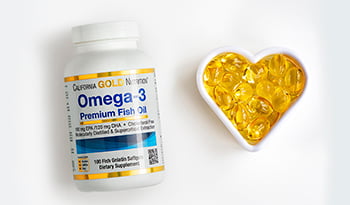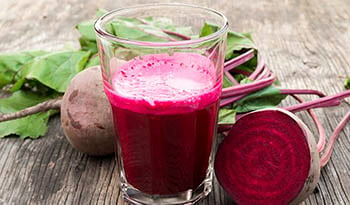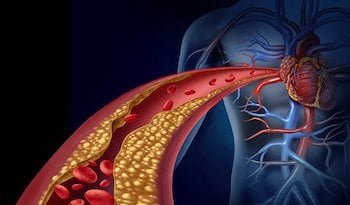CoQ10: Hjertesundhed, immunitet og andre sundhedsmæssige fordele

Opdateret april 2022/Oprindeligt indsendt juli 2017
Coenzym Q10 (CoQ10) er en væsentlig komponent i mitokondrier: den energiproducerende enhed i hver celle i din krop. CoQ10 er involveret i fremstillingen af ATP, som kroppen bruger til at producere energi. CoQ10's rolle svarer til tændrørens rolle i en bilmotor: uden den første gnist kan menneskekroppen ikke fungere.
CoQ10 kan laves i kroppen, men nogle gange producerer vores kroppe simpelthen ikke nok. Hjertet er et af de mest metabolisk aktive organer i kroppen, så en CoQ10-mangel påvirker dit hjerte mest og kan føre til alvorlige problemer. Mangel kan være resultatet af en dårlig kost, genetiske eller erhvervede defekter, der begrænser CoQ10-syntese eller øget vævsbehov. Hjerte- og karsygdomme, herunder højt kolesteroltal og højt blodtryk, kan øge vævets efterspørgsel efter CoQ10. Derudover kan personer ældre end 50 have brug for mere CoQ10, da niveauerne vides at falde med alderen.
Er der fødekilder til CoQ10?
Ja, men det typiske daglige indtag af CoQ10 fra kostkilder er kun ca. 3 til 5 mg: ikke i nærheden af det niveau, der kræves for at hæve blod- og vævsniveauet markant. Kød, fjerkræ og fisk udgør størstedelen af CoQ10 i kosten.
Hvad er de vigtigste anvendelser af CoQ10?
CoQ10-kosttilskud bruges mest til behandling eller forebyggelse af hjerte-kar-sygdomme såsom højt kolesteroltal, forhøjet blodtryk, kongestiv hjertesvigt, kardiomyopati, mitralventilprolaps, koronararterie-bypass-kirurgi og angina. Mange videnskabelige undersøgelser har valideret disse anvendelser. Derudover har CoQ10 vist sig at være nyttigt til bekæmpelse af diabetes, periodontal sygdom, immunmangel, kræft, fedme og muskeldystrofi.
Vær opmærksom på, at det kan tage otte eller flere uger med dagligt tilskud med CoQ10, før du vil se en mærkbar forbedring i nogen af disse sygdomme.
Hvordan forbedrer CoQ10 hjertefunktionen?
CoQ10 øger energiproduktionen i hjertemusklen og fungerer som en antioxidant. CoQ10-mangel er almindelig hos patienter med hjertesygdomme: Biopsiresultater fra hjertevævet hos patienter med forskellige hjerte-kar-sygdomme viste en CoQ10-mangel i 50 til 75 procent af alle tilfælde. Korrektion af en CoQ10-mangel kan ofte give dramatiske kliniske resultater hos patienter med enhver form for hjertesygdom.
Kan CoQ10 sænke blodtrykket?
Forskning viser, at 39 procent af patienter med forhøjet blodtryk har en CoQ10-mangel. I flere undersøgelser har CoQ10-tilskud vist sig at sænke blodtrykket hos patienter med hypertension, selvom effekten normalt ikke ses før efter otte til 10 uger. Typiske reduktioner i både systolisk og diastolisk blodtryk er i intervallet 10 procent.
Hvordan øger CoQ10 immunsystemet?
Væv og celler involveret i immunfunktionen er meget energiafhængige og kræver en tilstrækkelig forsyning af CoQ10 for optimal funktion. Undersøgelser har dokumenteret den immunforstærkende effekt af CoQ10. CoQ10 bør også bestemt bruges af kræftpatienter efter at have taget et kemoterapimedicin, der er forbundet med hjertetoksicitet, såsom adriamycin og athraliner.
Kan CoQ10 fremme vægttab?
Da CoQ10 er en væsentlig kofaktor for energiproduktion, er det muligt, at CoQ10-mangel er en faktor i nogle tilfælde af fedme. En undersøgelse af overvægtige mennesker fandt, at 52 procent havde lave CoQ10-niveauer. Da de fik 100 mg dagligt CoQ10, havde de et betydeligt vægttab.
Hvad er den bedste form for CoQ10?
Mest kommercielt CoQ10 produceres primært via en gærfermenteringsproces. CoQ10 fås i to udskiftelige kemiske former i kroppen - ubiquinon og ubiquinol. Disse to former er også tilgængelige som kosttilskud, men når de først er absorberet, er de to former udskiftelige. Cirka 95% af CoQ10 i kroppen er i ubiquinolform. Denne formular er den mest aktive form. Imidlertid resulterer indtagelse af ubiquinon normalt i en let omdannelse til ubiquinol i kroppen. Så begge former hæver i sidste ende ubiquinolniveauer i blodet. Hvis du tager ubiquinon, skal du tage det med mad (især med olier) for at forbedre absorptionen.
Hvor meget CoQ10 skal jeg tage?
For personer, der tager et statinlægemiddel eller dem, der søger generel antioxidantstøtte, er doseringen for CoQ10 generelt 100 mg for begge former. For dem med øget behov på grund af stress i hjertet, aldring, fedme eller diabetes; doseringen er 150 til 200 mg for ubiquinon og 100 til 150 mg for ubiquinol. Sørg for at tage CoQ10 sammen med mad for maksimal absorption.
Er CoQ10 sikkert?
Coenzym Q10 er meget sikkert: ingen alvorlige bivirkninger er nogensinde blevet rapporteret, selv ved langvarig brug. Da sikkerhed under graviditet og amning ikke er påvist, bør CoQ10 ikke anvendes i disse tidspunkter, medmindre den potentielle kliniske fordel (som fastlagt af en læge) opvejer risiciene.
Interagerer CoQ10 med nogen medicin?
Der er ingen kendte negative interaktioner mellem CoQ10 og noget lægemiddel eller næringsstof. Imidlertid kan mange lægemidler påvirke CoQ10-niveauerne negativt, og CoQ10 kan muligvis reducere bivirkningerne af nogle lægemidler. Ud over adriamycin har CoQ10-tilskud vist sig at modvirke nogle af de negative virkninger af visse kolesterolsænkende, betablokkere og psykotrope lægemidler. Lovastatin (Mevacor), pravastatin (Pravachol), atorvastatin (Lipitor) og simvastatin (Zocor) bruges til at sænke kolesterolniveauet i blodet ved at hæmme enzymet (HMG CoA reduktase), der kræves for at lave kolesterol i leveren. Desværre blokerer disse lægemidler også fremstillingen af andre stoffer, der er nødvendige for kropsfunktioner, herunder CoQ10. Tilskud med CoQ10 (50 mg pr. Dag) er nødvendigt for at forhindre dets udtømning i kropsvæv, mens du er på disse lægemidler.
Referencer:
- Schandalik R, Gatti G og Perucca E: Farmakokinetik af silybin i galde efter administration af silipide og silymarin hos cholecystektomipatienter. Arzneim Forsch 1992; 42 (7) :964-8.
- Barzaghi N, et al.: Farmakokinetiske undersøgelser af IDb 1016, et silybin-phosphatidylcholinkompleks, hos raske mennesker. Eur J Drug Metab Pharmacokinet 1990; 15 (4): 333-8.
- Mascarella S, m.fl. :Terapeutiske og antilipoperoxidante virkninger af silybin-phosphatidylcholinkompleks ved kronisk leversygdom: Foreløbige resultater. Curr Ther Res 1993; 53 (1) :98-102.
- Vailati A, et al.: Randomiseret åben undersøgelse af dosis-effekt-forholdet for et kort forløb af IDb 1016 hos patienter med viral eller alkoholisk hepatitis. Fytoterapi 1993; 44 (3) :219-28.
- Marena C og Lampertico P: Foreløbig klinisk udvikling af Silipide: Et nyt kompleks af silybin i toksiske leversygdomme. Planta Medicinsk 1991; 57 (S2): A124-5.
- Facino RM, et al.: Frie radikalers fjernende virkning og anti-enzymaktiviteter af procyanidiner fra Vitis vinifera. En mekanisme til deres kapillære beskyttende virkning. Arzneim Forsch 1994; 44:592-601.
- Schwitters B og Masquelier J: OPC i praksis: Biflavanoler og deres anvendelse. Alfa Omega, Rom, Italien, 1993.
- Corbe C, Boisin JP og Siou A: Lyssyn og chorioretinal cirkulation. Undersøgelse af virkningen af procyanidoliske oligomerer (Endotelon). J Fr Ophtalmol 1988; 11:453-60.
- Boissin JP, Corbe C og Siou A: Chorioretinal cirkulation og blændende: anvendelse af procyanidololigomerer. Bull Soc Ophtalmol Fr 1988; 88:173-4 177-9.
- Weihmayr T og Ernst E.Terapeutisk effektivitet af Crataegus. Fortschr Med 1996; 114:27 —9.
- Schmidt U, et al.: Effekt af Hawthorn (Crataegus) præparatet LI 132 hos 78 patienter med kronisk kongestiv hjertesvigt defineret som NYHA funktionel klasse II. Phytomed 1994; 1 (1): 17—24.
- Schussler M, Holzl J, Fricke U: Myokardievirkninger af flavonoider fra Crataegus-arter. Arzneim Forsch 1995; 45:842-5.
- Hertog MG, et al: Kostantioxidantflavonoider og risiko for koronar hjertesygdom: Zutphen Eldre Study. Lancet 1993; 342:1007-11.
- Wegrowski J, Robert Am og Moczar M:Virkningen af procyanidoliske oligomerer på sammensætningen af normale og hypercholesterolemiske kaninaortas. Biochem Pharmacol 1984; 33:3491-7.
- Wilkinson EG, et al.: Bioenergetik i klinisk medicin. VI. Supplerende behandling af periodontal sygdom med coenzym Q10. Common Chem Pathol Pharmacol 1976; 14:715-9.
- Hanioka T, et al.: Effekt af topisk anvendelse af coenzym Q10 på voksen parodontitis. Mol Aspects Med 1994; 15 (Suppl) :S241-8.
- Folkers K, et al.: Stigning i niveauer af IgG i serum hos patienter behandlet med coenzym Q10. Res Comm Pathol Pharmacol 1982; 38:335-8.
- Lockwood K, Moesgaard S, Folkers K. Partiel og fuldstændig regression af brystkræft hos patienter i forhold til dosering af coenzym Q10. Biochem Biophys Res Comm 1994; 199:1504-8.
- Lockwood K, Moesgaard S, Yamamoto T, Folkers K. Fremskridt med behandling af brystkræft med vitamin Q10 og regression af metastaser. Biochem Biophys Res Comm 1995; 212:172-7.
- Iarussi D, et al.: Beskyttende virkning af coenzym Q10 på antracycliners kardiotoksicitet: kontrolundersøgelse hos børn med akut lymfoblastisk leukæmi og ikke-Hodgkin-lymfom. Mol Aspects Med 1994; 15 (Suppl.) :s207-12.
- van Gaal L, de Leeuw ID, Vadhanavikit S og Folkers K: Undersøgende undersøgelse af coenzym Q10 i fedme. I: Folkers K, Yamamura Y, red.: Biomedicinske og kliniske aspekter af coenzym Q, bind 4. Elsevier Science Publ, Amsterdam, 1984. s. 369-73.
- Weiss M, et al.: Biotilgængelighed af fire orale coenzym Q10-formuleringer hos raske frivillige. Molec Aspects Med 1994; 15:273-80.
- Chopra RK, et al.: Relativ biotilgængelighed af coenzym Q10-formuleringer hos mennesker. Internat J Vit Nutr Res 1998; 68:109-13.
- Malqvist ML, et al.: Biotilgængelighed af to forskellige formuleringer af coenzym Q10 hos raske forsøgspersoner. Asien og Stillehavet J Clin Nutr 1998; 7:37-40.
- Zhang Y, Turunen M og Appelkvist EL: Begrænset optagelse af koetcoenzym Q er i modsætning til den ubegrænsede optagelse af alfa-tocopherol i rotteorganer og celler. J Nutr 1996; 126:2089-97.
- Ibrahim WH, et al.: Kostcoenzym Q10 og E-vitamin ændrer status for disse forbindelser i rottevæv og mitokondrier. J Nutr 2000; 130:2343-8.
- Kaikkonen J, et al.: Antioxidativ effekt af parallel og kombineret tilskud med coenzym Q10 og d-alfa-tocopherol hos milde lyhypercholesterolemiske forsøgspersoner: et randomiseret placebokontrolleret klinisk studie Free Radic Res 2000; 33:329-40.
- Bargossi AM, et al.: Eksogent CoQ10-tilskud forhindrer plasma-ubiquinonreduktion induceret af HMG-CoA-reduktasehæmmere. Mol Aspects Med 1994; 15 (Suppl.) :s187-93.
ANSVARSFRASKRIVELSE: Wellness Hub har ikke til hensigt at stille diagnoser...

















































































 Indholdsfortegnelse
Indholdsfortegnelse













